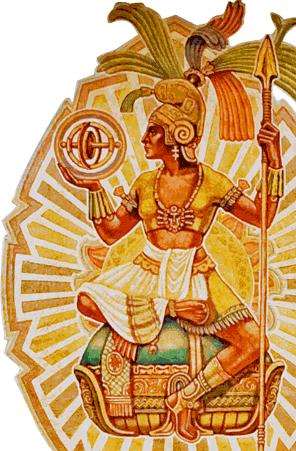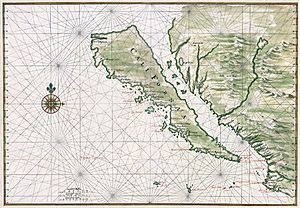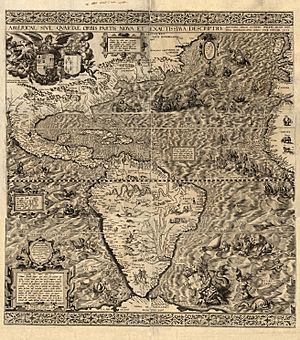Etymology of California facts for kids
Have you ever wondered where the name California comes from? Many people have different ideas, but most historians agree it probably started with a popular Spanish novel from the 1500s called Las Sergas de Esplandián. This book described a make-believe island named California, ruled by a powerful leader called Queen Calafia. This island was said to be east of the Indies.
When Spanish explorers first arrived in the 1500s, they found the Baja California Peninsula (which is now part of Mexico). They thought it was an island, just like the one in the novel! So, they named this new land California. At first, the name only referred to the Baja California Peninsula. But as explorers moved north, the area known as California grew. It eventually included the land that is now the U.S. state of California. To tell the two parts apart, the northern area became Alta (Upper) California, and the southern peninsula became Baja (Lower) California.
Today, the name California is used for many places around the world. But it usually refers to the U.S. state of California or the Baja California Peninsula in Mexico. When you hear "California" by itself, it usually means the U.S. state. But if you hear "Baja California," it refers to the peninsula or one of the Mexican states there, Baja California or Baja California Sur. Together, the U.S. and Mexican states are sometimes called The Californias.
Contents
The Storybook Origin: Las Sergas de Esplandián

In the early 1500s, a popular adventure novel called Las sergas de Esplandián (which means The Adventures of Esplandián) was published. In this book, California was the name of a magical island. This island was only home to strong, black warrior women, like the Amazons of ancient myths. The author, Garci Rodríguez de Montalvo, wrote that this island was east of the Indies and very close to a place called the Terrestrial Paradise. The island was ruled by a powerful leader, Queen Calafia.
For many years, no one connected this old novel to the name of California. But in 1862, a man named Edward Everett Hale discovered the link. He shared his findings, including parts of the original novel, in a magazine called The Atlantic Monthly in 1864. Hale believed that when Spanish explorers found the Baja California Peninsula, they named it after the fictional island in Montalvo's book. This was because the explorers thought the peninsula was an island, just like the one described in the story.
The novel describes the island of California like this: "Know, then, that, on the right hand of the Indies, there is an island called California, very close to the side of the Terrestrial Paradise, and it was peopled by black women, without any man among them, for they lived in the fashion of Amazons. They were of strong and hardy bodies, of ardent courage and great force. Their island was the strongest in all the world, with its steep cliffs and rocky shores. Their arms were all of gold, and so was the harness of the wild beasts which they tamed and rode. For, in the whole island, there was no metal but gold." –Las Sergas de Esplandián, published in Seville in 1510.
Hale thought that Montalvo might have gotten the name from the Spanish word calif, which means a leader of an Islamic community. Many people agreed with Hale's idea that both Calafia and California came from the Arabic word khalifa. This Arabic word means a "steward," "successor," or "leader." In Spanish, this word became califa. So, California could mean "land of the caliph," and Calafia could mean "female caliph."
Some scholars also wondered if Montalvo was influenced by an old French poem called The Song of Roland. This poem briefly mentions a place called Califerne. This place might have been named because it was a "caliph's domain," or a place where non-Christians lived. This idea is interesting, but it's hard to prove for sure.
Another Idea: The Song of Roland
The Song of Roland is a very old French poem from the 1000s. It tells the story of a battle in 778. In the poem, the word Califerne is mentioned as one of many lands. Its exact location isn't clear, but it's mentioned after a reference to Africa.
Here's a small part of the poem (lines 2920–2924): "Dead is my nephew, who conquered so much for me! Against me will rebel the Saxons, Hungarians, Bulgars, and many hostile men, Romans, Apulians, and all those of Palermo, And those of Africa, and those of Califerne;" –Song of Roland, 11th century
The word Califerne from The Song of Roland might have given Montalvo the idea for the name "California." Both stories involve battles between Christian and non-Christian armies. The author of The Song of Roland might have gotten the word Califerne from the word caliph as well.
Other Ideas for the Name's Origin
Over time, a few other ideas have been suggested for where the name California came from. However, historians usually don't find these ideas as strong as the one about the novel Las Sergas de Esplandián. Here are a couple of them:
Calida Fornax
This idea suggests the name comes from the Latin words Calida Fornax, which mean hot furnace. This might explain why an old map from around 1650 shows the name as two words, "Cali Fornia." It could mean California is a place that is hot, like a lime kiln (a type of oven).
Kali forno
Another idea is that the name comes from an old local language spoken in Baja California. Some people thought kali forno might mean "high mountains." But this idea doesn't work because the name "California" was in Montalvo's book before Spanish explorers even talked to Native Americans in that area.
How the Name Was Used

Many people think Hernán Cortés was the first to use the name California for the Baja Peninsula. But it was probably some of his explorers, like Diego de Becerra and Fortún Ximénez, who landed there in 1533. They were likely the first to call the peninsula California, thinking it was an island. Cortés himself didn't reach the peninsula until 1535.
Today, the name California is used for the Baja California Peninsula, the Gulf of California (also called the Sea of Cortés), the U.S. State of California, and the Mexican states of Baja California and Baja California Sur.
See also
 In Spanish: Toponimia de California para niños
In Spanish: Toponimia de California para niños
- California (disambiguation)
- Etymology
- Toponymy
- United States
- Mexico


